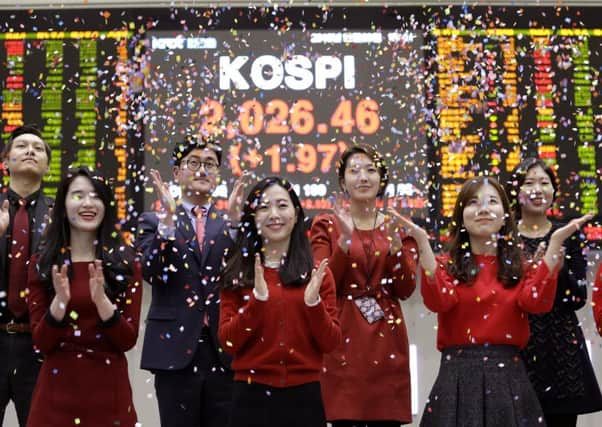Bill Jamieson: Beware piling in amid stock market cheer
This article contains affiliate links. We may earn a small commission on items purchased through this article, but that does not affect our editorial judgement.


First, share prices have greeted the New Year in champagne mood: the FTSE100 hit a record high of 7142.83 – up 1.1 per cent on the week, up by 17 per cent on January 2016, and by a stonking 21 per cent since the short-lived panic wobble after the EU referendum.
Second, the economic omens continue more upbeat than the doom-laden warnings of six months ago. Third-quarter UK GDP growth has been revised up to 0.6 per cent quarter-on- quarter. The economy is set to grow 2.1 per cent in 2016 and while a slowdown to 1.3 per cent is forecast for the New Year, this is not the recession that was widely predicted.
Advertisement
Hide AdAdvertisement
Hide AdAnd third, the dreaded tax return is now out of the way for many households. More than 14,000 people spent the festive season avoiding the turkey and leftovers and instead filing their tax return. According to HM Revenue and Customs, some 1,944 filed their tax return online on Christmas Day while a further 6,214 submitted on Christmas Eve and 6,200 filed their return on Boxing Day. The break over Christmas and New Year – just one month before the 31st January self-assessment tax return deadline – is often a popular time to submit, with more than 20,000 doing so.
All upbeat and sunny side up, then? Not quite. Seldom has a new peak for the market been greeted with such misgiving and apprehension. The year ahead will be dominated by arguments over Brexit, uncertainty in America over the Donald Trump, right, presidency and deep unease over politics in Europe with critical elections pending in France, the Netherlands and Germany. Let’s not deny the positives. The US economy is in remarkably good shape. Over the past year the economy has added more than two million jobs, third quarter GDP growth came in at 3.5 per cent, the highest in two years, while house sales and car production are buoyant.
But it’s this very buoyancy that may cause investors to fret over what the Trump presidency may bring. He has promised a big uplift in federal government spending on infrastructure, together with business and household tax cuts. Coming on top of already robust economic growth, this would be stimulus on stilts.
Lowland investment trust manager James Henderson is keen to highlight the positives. He believes there are investment opportunities in a corporate world that is less reliant on capital expenditure and can benefit from technological advances. “Today we have smartphones that can do so much, considering that previously we had to carry a phone, calculator, diary and camera.” From an investment perspective, the need for capital expenditure is lower because companies are now ‘capital light’. The priority today is ‘intellectual control’ and ‘intellectual development’, which is higher margin. But the coming stimulus boost and more Federal government spending promised by Trump comes on top of an already massive debt pile. This stands at $14.3 trillion or about 76 per cent of GDP.
And America is far from alone in its chronic reliance on debt to keep federal spending at a level to which voters have become fatefully accustomed in recent times. Bruce Stout, manager of Murray International trust, part of the Aberdeen Asset Management stable, and Peter Ewins, who runs the F&C Global Smaller Companies trust, both point to the economic dangers posed by high levels of global debt.
For them, as TrustNet reports, this is a world of zombie companies, rigged bond markets and unjustified dividend payouts. Making matters worse, the forthcoming Trump presidency offers further risks.
We are deep into an economically abnormal post financial crisis world. “None of us have seen this before”, Stout warns. “The last seven years have been so different, with negative gilt yields and banks being paid to hold money. This is not normal.”
And he offers this bleak assessment: “If you don’t let companies go bust, then you don’t let free market economics work. The walking dead in the corporate world exist in perpetuity, which forces down prices in industry, manufacturing, services and retail,’ he said. Ewins echoed Stout’s sentiments. In an environment where equity and bond markets have been distorted by quantitative easing, which has involved asset purchases and ultra-low interest rates, he believes it is hard to justify the dividends paid out by some companies.
Advertisement
Hide AdAdvertisement
Hide Ad“At some point in time”, he warns, “the equity markets will catch a cold.” Amid the New Year celebrations, there’s good cause to be wary of piling in.